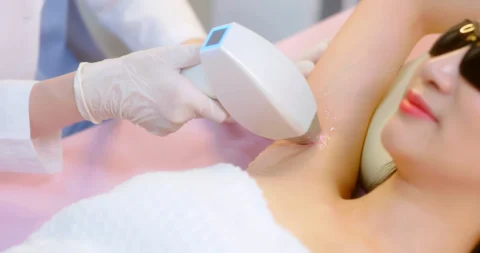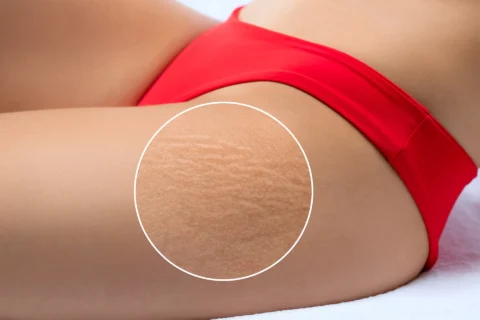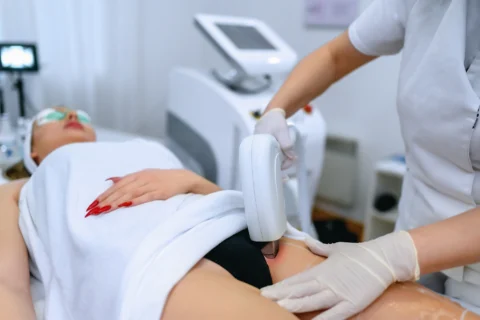Navigating Hair Removal Decisions While Pregnant
Unwanted hair growing in embarrassing places is bad enough. But when you’re pregnant and your hair seems to be sprouting everywhere overnight? That’s a whole other story.
If you’re looking for ways to remove unwanted hair during pregnancy, you may be tempted to turn to laser hair removal for quick results. But is this an effective and safe option for moms-to-be?
Laser hair removal is one of the most popular ways to get rid of excess hair these days. But just because something is popular, doesn’t mean it’s right for everyone. When you’re pregnant, considerations about what’s safe for both you and baby have to come first.
So should you get laser hair removal during pregnancy? Or are there better alternatives? Let’s take a look at the risks, recommendations, and safer options so you can make the most informed choice.
Is Laser Hair Removal Safe During Pregnancy?
If you’re curious whether or not you can undergo laser hair removal treatments while pregnant, you’re definitely not alone.
Many women want to know if this seemingly quick and easy solution for dealing with increased hair growth is actually safe or not.
So, the main question women here is: can you get laser hair removal while pregnant?
The short answer, according to most doctors and medical professionals (as well as the American Pregnancy Association), is no—laser hair removal is not considered safe to undergo during pregnancy.
Below’s an overview of the main risks and cautions against this hair removal method while expecting:
Lack of Evidence on Safety
There have not been enough long-term studies done to show that laser hair removal is completely safe during pregnancy. The unknown potential effects on the developing fetus make most healthcare providers recommend avoiding it.
Potential Damage to Fetus
The heat and light energy from the laser can potentially reach the uterus and affect the unborn baby. There are concerns that exposure could damage the developing fetus.
Without long-term studies, there’s no way to guarantee these strong lights can’t negatively affect the unborn baby in some way. So most doctors recommend playing it safe and avoiding laser procedures altogether during pregnancy.
Increased Skin Sensitivity
Another issue during pregnancy is increased sensitivity in the skin. Hormones like estrogen, progesterone, and HCG rise rapidly during this time, which can change collagen levels and thin out the skin.
This makes pregnant women more susceptible to irritation, rashes, and burns from laser hair removal treatments. The powerful beams of light may end up causing painful burns or blisters rather than safely eliminating hair.
Excessive Bleeding or Scarring
The increased blood circulation during pregnancy raises concerns about excessive bleeding or scarring from laser procedures.
After treatment, it’s common to see some minor redness and swelling around the hair follicles. But on highly vascularized pregnant skin, excessive bleeding and spotting could potentially occur and be harder to stop.
Interference with Hair Regrowth Cycle
Getting laser hair removal during pregnancy may disrupt the normal postpartum hair regrowth cycle. More research is needed in this area.
After giving birth, high levels of estrogen and progesterone drop rapidly. This triggers excess shedding of hair that grew thicker during pregnancy. Getting lasers during this time may disrupt the cycle.
Some women who’ve undergone hair removal treatments while pregnant report issues like hair taking longer than normal to shed, odd regrowth patterns, or areas never returning to their pre-pregnancy state. Again, more research is needed, but it’s enough to make doctors want women to wait until after birth.
Effects on Amniotic Fluid
Some doctors worry that using lasers could potentially contaminate or heat up the amniotic fluid, with unknown effects on the baby.
With all of these potential risks, it’s easy to see why most medical professionals advise pregnant women to wait until after giving birth to undergo laser hair removal treatments. The lack of clear evidence that it’s 100% safe means it’s always better to be cautious.
Why You Should Wait To Get Laser Hair Removal If Pregnant
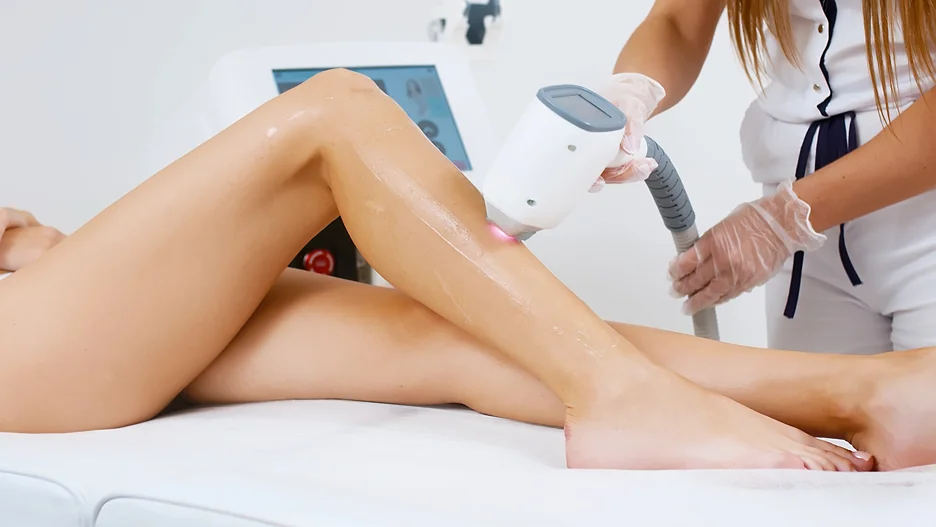
With all the above risks, it’s not surprising that most healthcare providers advise against getting laser hair removal while pregnant.
Doctors suggest waiting until at least 3-6 months after giving birth before considering laser hair removal. This allows hormones to return to normal levels and reduces the risks. By then, any pregnancy-related hair changes will have stabilized as well.
As we’ve mentioned, the American Pregnancy Association cautions that no hair removal treatment has been proven completely safe during pregnancy yet. So the recommendation is to avoid treatments like lasers, electrolysis, or other heat-based methods until after delivery.
Even many laser hair removal specialists will not knowingly treat a pregnant woman. The lack of evidence proving it’s 100% safe for the developing baby is too much of a liability.
What Do Doctors and Medical Professionals Recommend Instead?
Rather than lasers, most doctors recommend pregnant women stick to tried and true hair removal methods like shaving, waxing, plucking, epilators, or hair removal creams. These have been used safely for many years and are not known to pose risks during pregnancy.
While inconvenient, shaving is probably the most recommended method during pregnancy, especially on sensitive areas like the bikini line. Just use a fresh razor each time and moisturize after to prevent irritation.
For waxing, doctors advise keeping it to small areas and testing your pain tolerance first. Wax formulated with natural oils and smaller strips can help minimize discomfort. Stay away from chemical depilatory creams, especially on the face, due to ingredients that can irritate skin.
Electrolysis is another option that involves killing the hair follicle with a small probe. But the process is slow, so it’s not ideal for large areas during pregnancy when rapid hair growth occurs.
Your doctor can best advise on hair removal methods that are safe for your particular pregnancy. But in general, methods that do not involve heat, lasers or chemicals have the least risks.
The table below summarizes the safety considerations for some common hair removal methods during pregnancy:
| Method | Safety During Pregnancy |
| Shaving | Considered safe |
| Waxing | Considered safe in moderation |
| Laser Removal | Not recommended |
| Electrolysis | Not recommended |
| Depilatory Creams | Use caution/natural options only |
Tips for Managing Unwanted Hair During Pregnancy
While laser hair removal isn’t recommended during pregnancy, that doesn’t mean you have to live with excess hair growth for 9+ months either. There are ways to help maintain things safely during this time. Here are some tips:
Trim, don’t remove entirely. Using a trimmer or scissors to shorten unwanted hair is safer than trying to fully remove it all at the root. This can help keep things tidy.
Focus on visible areas. Rather than full body hair removal, consider just managing more visible areas like your bikini line, legs, underarms or upper lip.
Exfoliate first. Gently exfoliating before shaving, waxing or other methods can help hairs release from the skin to be removed more easily. Use a soft natural loofah or exfoliating gloves.
Moisturize after. Calm any irritation from hair removal and soften skin with aloe vera gel or natural oils like coconut, almond or jojoba.
Avoid harsh chemicals. With any creams, look for natural options free of irritants like calcium hydroxide or thioglycolate. Or stick to simpler shaving.
Use smaller trimmers. For facial hair, invest in a smaller precision trimmer that’s safe to use around the lips, cheeks and chin.
Take breaks. During the most sensitive first trimester, consider taking a break from hair removal methods altogether until the second trimester.
Relax your standards. Pregnancy hormones are only temporary. Don’t stress over trying to keep everything perfectly hair-free until after baby arrives.
Try natural hair growth inhibitors. Some natural oils like eucalyptus, lavender, tea tree and cedarwood may help slow hair growth when applied. But
To Sum It Up
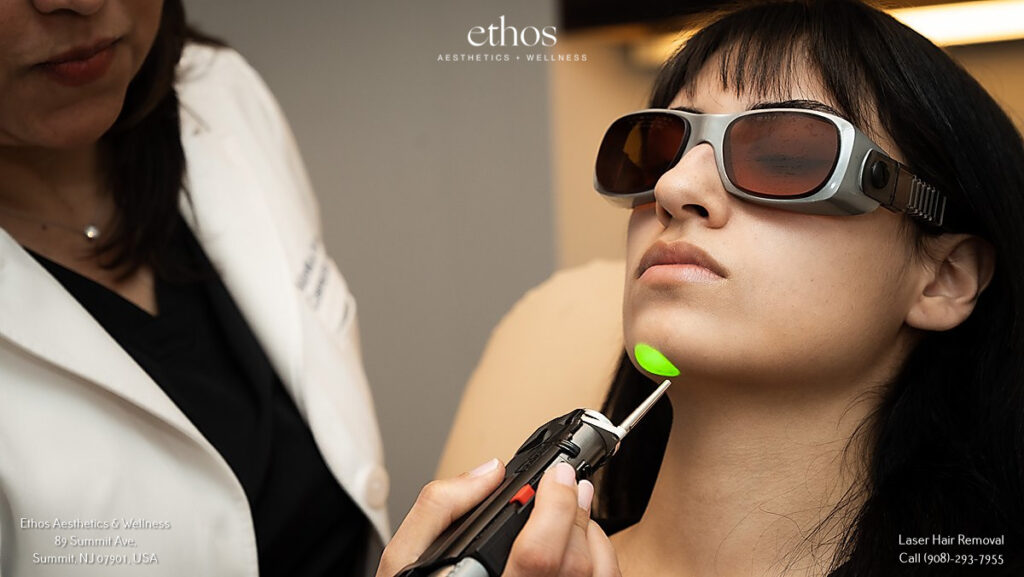
If you’re still considering laser hair removal, have a careful discussion with both your doctor and the laser technician about your particular case. But again, most medical professionals do not recommend it.
Examine your options. Should you find yourself confused or uncertain, don’t hesitate to consult with the experts at Ethos Spa for further guidance.
With the right approach, you can keep up a simple hair removal routine during pregnancy. Just remember to keep things basic, focus on smaller areas, and avoid harsh chemicals or heat treatments. Your doctor can always provide more guidance for your specific situation as well.
Above all—be kind to yourself! The extra hair growth is temporary. And you have bigger priorities right now than being completely stubble-free. Before you know it, your hormones will balance back out after childbirth.





